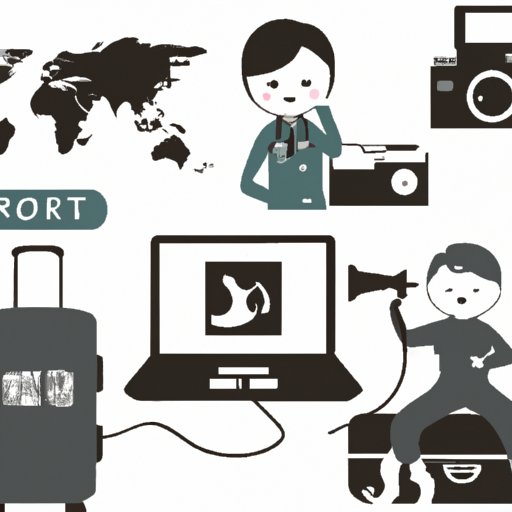Introduction
A traveling sonographer is a medical professional who performs ultrasounds on patients in a variety of settings. They often travel to different hospitals, clinics, and doctor’s offices to work with patients and provide diagnostic imaging services. Becoming a traveling sonographer can offer many benefits such as the opportunity to travel, gain new skills, and work with a variety of patients.

Research the Requirements for Becoming a Traveling Sonographer
The first step in becoming a traveling sonographer is to research the licensing requirements in your state or country. Each state has its own unique regulations and requirements when it comes to sonographers. It is important to understand these requirements before you begin the process of becoming a traveling sonographer.
In addition to licensing requirements, you will need to meet certain educational and experience requirements in order to become a traveling sonographer. Many states require that you have a minimum of an associate’s degree in ultrasound technology or a related field. You may also need to have completed a certain number of hours of clinical experience. It is important to research these requirements in advance so that you are fully prepared for the application process.

Explore Different Companies that Hire Traveling Sonographers
Once you have researched the requirements for becoming a traveling sonographer, it is time to start looking at potential employers. There are many companies that hire traveling sonographers and offer competitive pay and benefits. Research different companies to find out what they offer and if they are a good fit for your career goals.
When researching companies, look into their reputation and ask around to see what other sonographers have to say about them. It is also important to make sure the company you choose offers competitive pay, benefits, and flexible scheduling options. This will ensure that you are able to make a living while working as a traveling sonographer.
Gather the Necessary Credentials and Experience to Qualify
Once you have identified potential employers, it is time to prepare your resume and gather the necessary credentials and experience to qualify for the job. Your resume should highlight your experience, education, and any certifications or awards you have earned. Make sure to include any relevant volunteer experience or other activities that demonstrate your commitment to the profession.
You should also take the time to understand the qualifications needed to become a traveling sonographer. This includes knowing the types of scans you will be expected to perform and understanding the safety protocols required by the facility. Taking the time to research these qualifications will help you stand out from other applicants and give you an advantage when applying for positions.
Learn How to Market Yourself as a Traveling Sonographer
As a traveling sonographer, you need to be able to market yourself effectively in order to get hired. Developing a professional portfolio is a great way to showcase your skills and experience. Include examples of your work, client testimonials, and any awards or recognition you have received. This will give potential employers a better idea of who you are and why you would be a great fit for the job.
In addition to creating a portfolio, make sure to use social media platforms to network and promote yourself. Creating a LinkedIn profile and joining relevant groups can help you connect with other sonographers and grow your professional network. You can also use Twitter and Instagram to share updates and images of your work.

Network with Other Professionals in the Field
Networking is another important part of becoming a successful traveling sonographer. Joining organizations like the American Registry for Diagnostic Medical Sonography (ARDMS) or the American Institute of Ultrasound in Medicine (AIUM) can help you stay up to date on industry trends and connect with other professionals in the field. Attend conferences and seminars to learn more about the latest developments in the field and meet other sonographers.
You can also find mentors and colleagues who can help you develop your career. Reach out to experienced sonographers in your area and ask for advice and guidance. Having a mentor can help you stay motivated and focused on achieving your goals.
Conclusion
Becoming a traveling sonographer can be an exciting and rewarding career path. It requires dedication, hard work, and a commitment to providing quality patient care. By researching the requirements, exploring different companies, gathering the necessary credentials and experience, learning how to market yourself, and networking with other professionals in the field, you can become a successful traveling sonographer.
(Note: Is this article not meeting your expectations? Do you have knowledge or insights to share? Unlock new opportunities and expand your reach by joining our authors team. Click Registration to join us and share your expertise with our readers.)
